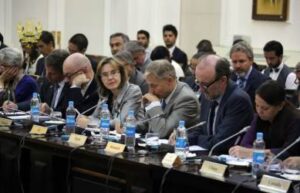Well over a decade of negotiations on Iran’s nuclear program finally reached a conclusion as the parties signed the Joint Comprehensive Plan of Action (JCPOA) in Vienna on Tuesday. Negotiations between Iran and six world powers – the US, UK, France, China and Russia plus Germany – began in 2006.
Nasrullah Stanekzai, Kabul University Professor believed the agreement was beneficial for Afghanistan as well, especially in terms of peace and stability. He believed that if Iran was to obtain a nuclear weapon, Afghanistan would have been wedged between two nuclear powers (Pakistan and Iran), which could have had negative ramifications for the country.
Talking to SW, he noted that a weak Afghanistan tucked between two nuclear powers would have invited deep intervention in Afghanistan’s internal affairs.
In eyes of political analyst Mohammad Nategh, the deal will enhance Afghanistan’s political and diplomatic relationships with Iran and western world. He believed that improved relations between Iran and the United Sates will ultimately leave positive impacts over Iran-Afghanistan ties.
President Mohammad Ashraf Gani welcomed the deal and dubbed it as a contributing factor for stability of the region.
Former president Hamid Karzai too facilitated the Iranian leadership over the deal. In a message on social media Karzai considered it as a mean of promoting peace in the region and the world.
According to the JCPOA, Iran's current stockpile of low-enriched uranium will be reduced by 98 percent, from 10,000 kg to 300 kg. This reduction will be maintained for at least fifteen years. Iran will reduce by at least two-thirds the number of its centrifuges from its current stockpile of 19,000 centrifuges
Iran will not build any new uranium-enrichment facilities for fifteen years. Iran may continue research and development work on enrichment, but that work will take place only at the Natanz facility and will be limited to eight years.
The IAEA will have oversight "over Iran's entire nuclear supply chain, from uranium mills to its procurement of nuclear-related technologies.
In return, the United States and the European Union would lift their nuclear-related sanctions against Iran after the IAEA verifies that several key steps have been taken Sanctions relating to ballistic missile technologies would remain for eight years; similar sanctions on conventional weapon sales to Iran would remain for five years. Eight years into the agreement, EU sanctions against a number of Iranian companies and individuals (such as Qasem Soleimani) will be lifted.
However, all U.S. sanctions against Iran related to human rights abuses, missiles, and support for terrorism are not affected by the agreement and will remain in place.
ENDS





